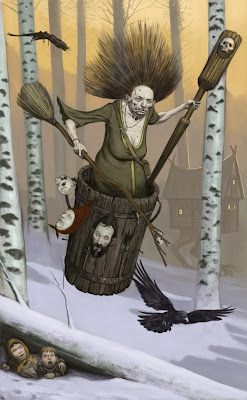On a recent course at Schumacher College, we were accompanied for part of a day by the mythologist and storyteller, Martin Shaw, who, at the end of our walk, gathered around a fire in the grounds, evoked a story that he felt, rightly, resonated with our theme (of peace seeking, of spiritual activism), taken from the Norwegian, the venturing of two twins, one alluringly beautiful, the second shameless and weird. What was beautiful in the telling, apart from the resonating craft of it, was the ability to weave asides asking us to reflect on its unfolding meaning without ever disrupting the flow or the ability of the given images to strike the embodied depths of the listeners before they reached the surfaces of our minds.
It is a quality that carries over into his book, 'A Branch of the Lightning Tree: Ecstatic Myth and the Grace of Wildness' to allow the stories he relates to stand for and by themselves as they too carry his reflective themes. These themes themselves illuminate without ever tipping over into reducing explanations. This is a fine balance. The unfolding truths are in the stories themselves and their abiding images, not in our framing (whether literary, psychological or religious).
At the heart of the book are three claims to consider. The need to achieve a necessary balancing between the wilderness and the village and our difficulty is as much about being able to re-enter the life of the everyday, of our communities, with our wild insight as it is to learn, once more, to listen to nature's speaking and in that speaking hear the voices of the spirits, the charges of the gods.
The second is that whatever Shamanism is (and its elasticity has become a legend), it rests in achieving this balance. It most emphatically is not about any form of 'self-transformation' that rests at the level of the self, of my ecstatic experience alone, but rest in its gifts, ones that always carry a wounding, and that must be shared with others for their healing. Not for nothing does a Siberian shaman describe their vocation as a 'curse'!
The third that in our shadow, in the fierce mirroring of the forces we reject, are our opportunities for healing. The hag witch or the fearsome bear is a meeting that is potentially redemptive if you meet it on its terms yet with all your wits about you. It is in Baba Yaga's realm (see above) in which Ivan discovers the maiden he will marry and though he slays Baba Yaga, he carries away her gifts. The shadow too, as Jung remarked, carries within it what we reject of ourselves of both the good and the bad. We can be off put by the threat of our own transfiguring freedom as of the reality of our cramped mean spiritedness.
The book shows (rather than tells) its stories and as you enter into their spirits, you can feel yourself pondering to which part of oneself, active or passive, embraced or rejected, do these images speak and to which you find yourself listening.
There was a moment in his storytelling at Schumacher when he asked us whether any of us, in fact, were twins. I wanted to answer yes (even, if in fact, the answer is no) because something of the 'shameless twin' who leads out and on her more convention bound counterpart, suddenly became alive in my experience. This is why, I suddenly felt, I keep pushing through all my inherited insecurities to try out the new, to venture new projects, grounded in a compassion beyond what I usually feel (or can express). The image of the thrusting twin resonated through me and past perceptions are reconfiguring in its light with the thought as to what possibilities a more conscious appreciation might bring, maybe the discovery of a deeper voice.
This is what story does, at its heart, it makes you considered new.

Comments
Post a Comment